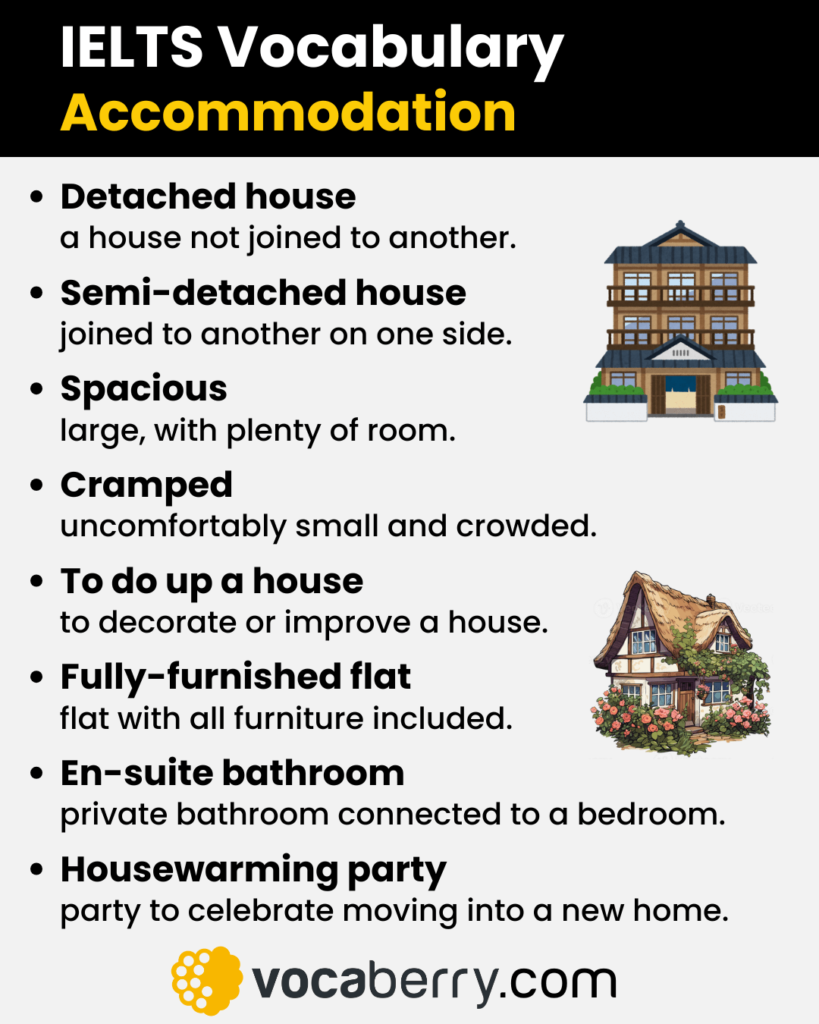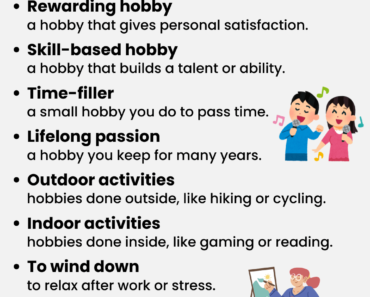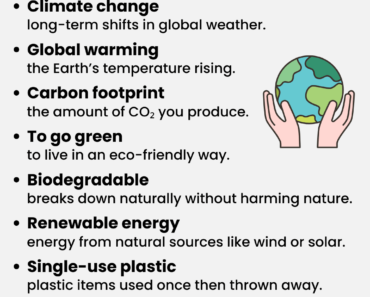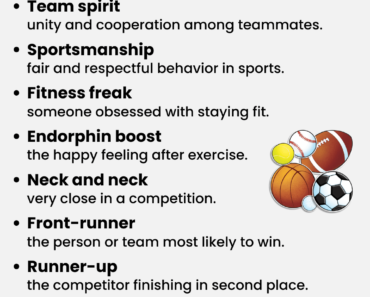
Accommodation is another frequent topic in the IELTS Speaking test. Examiners may ask you about the type of place you live in, your ideal home, or housing problems in your country. In this guide, you’ll find useful IELTS vocabulary for accommodation with clear definitions, followed by IELTS Speaking Part 1, Part 2, and Part 3 questions with sample answers.
IELTS Vocabulary for Accommodation
Here is some useful IELTS vocabulary for talking about accommodation with clear definitions. These words and phrases will help you give better answers in the IELTS Speaking test.
- Detached house – a house not joined to another.
- Semi-detached house – joined to another on one side.
- Terraced house / row house – part of a line of identical houses.
- Apartment / flat – a unit inside a larger building.
- Studio flat – small apartment with one main room.
- Condominium (condo) – apartment owned, not rented.
- Penthouse – luxury flat at the top of a tall building.
- Dormitory (dorm) – student housing.
- Student digs – informal term for student accommodation.
- Hall of residence – student housing provided by a university.
- Bungalow – a single-storey house.
- Cottage – small, traditional house, often in the countryside.
- Tenant – person renting a property.
- Landlord / landlady – owner who rents property.
- Rent – money paid to live in a property.
- Mortgage – loan to buy a house.
- Bought accommodation – a home you own.
- Rented accommodation – a home you pay to live in.
- Lease agreement – legal contract for renting.
- Deposit – money paid in advance as security.
- Housing market – buying and selling homes.
- Affordable housing – housing at a reasonable price.
- High-rise building – tall apartment block.
- Suburbs – residential area outside the city.
- On the outskirts – area at the edge of a city.
- City centre / downtown – central part of a city.
- Residential area – area where people live.
- Block of flats – large building divided into apartments.
- Next door – immediately beside your house.
- Spacious – large, with plenty of room.
- Compact – small but efficiently designed.
- Cramped – uncomfortably small and crowded.
- Poky – very small and cramped.
- Shabby – in poor condition from age or neglect.
- Cluttered – too many things in one space, messy.
- Run-down – in poor condition.
- Newly-built – recently constructed.
- Fully-furnished flat – flat with all furniture included.
- Bills included – rent covers water, electricity, etc.
- Maintenance cost – money spent to keep a property in good condition.
- Modern amenities – facilities like Wi-Fi, heating, air conditioning.
- En-suite bathroom – private bathroom connected to a bedroom.
- Utility room – room for washing machines, cleaning supplies, etc.
- Single-storey – house with only one floor.
- Two-storey – house with two levels.
- Home comforts – things that make a house pleasant.
- Cozy – warm and comfortable.
- Comfy – comfortable and pleasant.
- Noisy neighbourhood – area with a lot of sound.
- Peaceful neighbourhood – quiet area.
- Shared accommodation – living with others.
- Utility bills – payments for water, gas, electricity.
- Household chores – cleaning, cooking, etc.
- Dream home – ideal place to live.
- Renovation – improving or repairing a property.
- Homelessness – not having a place to live.
- Overcrowded housing – too many people in one place.
- Housing shortage – not enough homes for people.
- Slum area – very poor, overcrowded housing.
- A run-of-the-mill house – an ordinary, average home.
- Floor-to-ceiling windows – very tall windows from floor to ceiling.
- Gentrification – renovating old areas, raising prices, pushing out locals.
- Tenant eviction – being forced to leave a rental property.
- Eviction notice – official order to leave a property.
- Property ladder – the idea of buying and selling homes to improve wealth.
- Council housing / social housing – government-provided affordable housing.
- First-time buyer – person purchasing a home for the first time.
- House-hunting – looking for a place to live.
- Commute – daily travel from home to work.
- Squatter – person living illegally in an empty building.
- Bidding war – when buyers compete by raising offers.
- Landlord dispute – conflict between tenant and property owner.
- Lease renewal – extending a rental contract.
- Housing policy – government rules about homes.
- Permanent address – official long-term residence.
- Accommodation crisis – severe lack of housing options.
- In the heart of the city – in the central part of a city.
- Within walking distance – close enough to walk.
- Hustle and bustle – busy and noisy activity, often in cities.
- Mod cons – modern conveniences like dishwasher or microwave.
- Couch-surfing – staying at someone’s home for free, often short-term.
- Close-knit community – a group of people with strong relationships.
- Housewarming party – party to celebrate moving into a new home.
- To do up an old house – to decorate or improve a house.
- To completely refurbish – to renovate a property fully.
- To take out a mortgage – to borrow money from a bank to buy a house.
- To buy a place of my own – to purchase a personal home.
- To buy a second home – to own another house, often for holidays.
- To move in – to start living in a new home.
- To move out – to leave a home permanently.
- To make yourself at home – to feel relaxed and comfortable in someone’s house.
- To feel homesick – to miss your home when you’re away.
- To feel at home – to feel relaxed in a place.
- To live on campus – to stay in university housing.
- To put down a deposit – to pay money in advance when renting or buying.
- To give notice – to tell the landlord you are leaving.
- To add an extension – to build an extra room or section on a house.
- To paper the walls – to cover walls with wallpaper.
- To get on the property ladder – to buy your first home.
- To get on well with neighbors – to have a good relationship with neighbors.
- There’s no place like home – expression of comfort about one’s own home.
- Home sweet home – expression of comfort and happiness at home.
IELTS Speaking: Accommodation Questions & Answers
In this section, you’ll find IELTS Speaking Part 1, Part 2, and Part 3 questions on accommodation with sample answers. These examples show how the accommodation vocabulary can be used in your responses during the test.
IELTS Speaking Part 1 – Accommodation
Do you live in a house or an apartment?
I live in a flat / apartment in a block of flats near the station. It’s a fully-furnished flat with bills included and all the modern amenities, so life’s easy. It’s within walking distance of work, so my commute is short.
What do you like about the place where you live?
It’s small but cozy, and the bedroom has an en-suite bathroom. The living room has floor-to-ceiling windows, and the kitchen’s packed with mod cons, so it really has those home comforts.
Is there anything you would like to change about your home?
I think my living room is a bit cluttered, so I’d love to make it more spacious and cozy. If possible, I’d invest in a small renovation and perhaps buy some new furniture to create my own version of a dream home.
Do you prefer living in the city centre or the suburbs?
I like being in the heart of the city because everything’s close, though the hustle and bustle can be tiring. The suburbs / on the outskirts are quieter and more peaceful, but the commute is longer.
What would your dream home be like?
Ideally, a detached house or a country cottage, two-storey and spacious, with modern amenities and a patio. As a hopeful first-time buyer, I’m saving to get on the property ladder and eventually buy a place of my own.
IELTS Speaking Part 2 – Accommodation Cue Card
Describe a house or apartment you would like to live in.
You should say:
- where it would be
- what it would look like
- what special features it would have
- and explain why you would like to live there.
Sample Answer:
If I could design my ideal place to live, I’d probably choose a detached house located on the outskirts of a big city. That way, I’d be close enough to the city centre to enjoy the convenience of shops and restaurants, but far enough away to escape the hustle and bustle and enjoy a more peaceful neighbourhood.
The house itself would definitely be newly-built and quite spacious, with at least two floors. I’d like it to be a two-storey property with an open-plan living room and modern amenities like underfloor heating and smart appliances. I imagine it would have huge floor-to-ceiling windows to let in lots of natural light, and perhaps a loft conversion I could use as a study or even a small library. Outside, I’d love to have a patio and garden where I could relax or host a housewarming party.
Another important feature would be that the house was fully furnished with stylish but comfy furniture. I’d want an en-suite bathroom in every bedroom, a utility room for laundry, and of course all the latest mod cons, because I think comfort and practicality go hand in hand. Ideally, it would also be within walking distance of a park or some green space.
The main reason I’d love to live there is that it would really feel like my dream home. At the moment, I live in a rented flat, and although it’s convenient, it doesn’t give me the same feeling of stability. Owning my own place would allow me to get on the property ladder, stop worrying about rent, and truly make myself at home. Honestly, if I had a house like that, I’d probably say every day, “there’s no place like home.”
IELTS Speaking Part 3 – Accommodation Discussion
IELTS Speaking Part 3 questions about accommodation often ask you to compare different types of housing, discuss housing affordability, and give opinions on issues such as urban living, renting versus buying, and future housing trends.
How have housing styles changed in your country over the years?
In my country, housing styles have changed quite dramatically. In the past, people mostly lived in detached houses or bungalows, especially in the countryside. Nowadays, because of urbanisation and population growth, many people live in high-rise buildings or large blocks of flats. These are often more compact than traditional houses but come with modern amenities like central heating or high-speed internet. I think the shift reflects not only the housing market but also the way people’s lifestyles have become faster and more urban.
Why do many young people prefer to rent accommodation rather than buy a home?
One major reason is the cost. In many cities, the price of buying property has skyrocketed, so young people cannot afford to put down a deposit or take out a mortgage. Renting is more flexible and allows them to live in the city centre or within walking distance of their workplace without a huge financial burden. Also, renting usually means the maintenance costs are covered by the landlord, which makes it easier for people who move frequently or are just starting their careers.
Do you think governments should provide more affordable housing?
Yes, I think governments should play a role in this. Many people struggle with housing shortages, especially in big cities where overcrowded housing is becoming common. Council housing or social housing can give low-income families a chance to live in decent conditions. Without government intervention, the accommodation crisis will only get worse, and more people may face homelessness. Of course, it’s not easy to balance demand and supply, but ensuring affordable housing should be a priority.
How important is the location of a home?
I believe location is one of the most important factors when choosing a home. Living in the city centre or in the heart of the city often means higher rent or prices, but it also gives easy access to shops, public transport, and job opportunities. On the other hand, people who live on the outskirts or in the suburbs can enjoy larger, more spacious homes and a more peaceful neighbourhood. So, it depends on lifestyle: some people prefer convenience, while others want comfort and space.
Do you think people’s idea of a dream home is the same across generations?
Not really. For older generations, the dream home was often a big family house with a garden, sometimes even a cottage in the countryside. Younger generations, however, are more focused on practicality. Many would be happy with a modern apartment that has all the mod cons, good internet, and is close to public transport. In fact, some young people are even open to short-term rentals or student digs if it allows them more freedom to travel or work abroad. So, I’d say the idea of the perfect home changes depending on people’s priorities.
More IELTS Vocabulary Topics
If you found this lesson useful, explore other IELTS Speaking topics to expand your vocabulary and practice with sample answers:
- IELTS Vocabulary: Advertisement
- IELTS Vocabulary: Animals
- IELTS Vocabulary: Art
- IELTS Vocabulary: Artificial Intelligence
- IELTS Vocabulary: Books
- IELTS Vocabulary: Childhood
- IELTS Vocabulary: Crime and Punishment
- IELTS Vocabulary: Culture and Traditions
- IELTS Vocabulary: Daily Routine
- IELTS Vocabulary: Education
- IELTS Vocabulary: Environment
- IELTS Vocabulary: Family
- IELTS Vocabulary: Fashion and Clothes
- IELTS Vocabulary: Films
- IELTS Vocabulary: Food & Diet
- IELTS Vocabulary: Friends
- IELTS Vocabulary: Gifts
- IELTS Vocabulary: Health
- IELTS Vocabulary: Hobbies
- IELTS Vocabulary: Hometown
- IELTS Vocabulary: Money
- IELTS Vocabulary: Museums
- IELTS Vocabulary: Music
- IELTS Vocabulary: Plants
- IELTS Vocabulary: Shopping
- IELTS Vocabulary: Social Media
- IELTS Vocabulary: Sports
- IELTS Vocabulary: Technology
- IELTS Vocabulary: Transport
- IELTS Vocabulary: Travel
- IELTS Vocabulary: Weather
- IELTS Vocabulary: Work & Jobs






